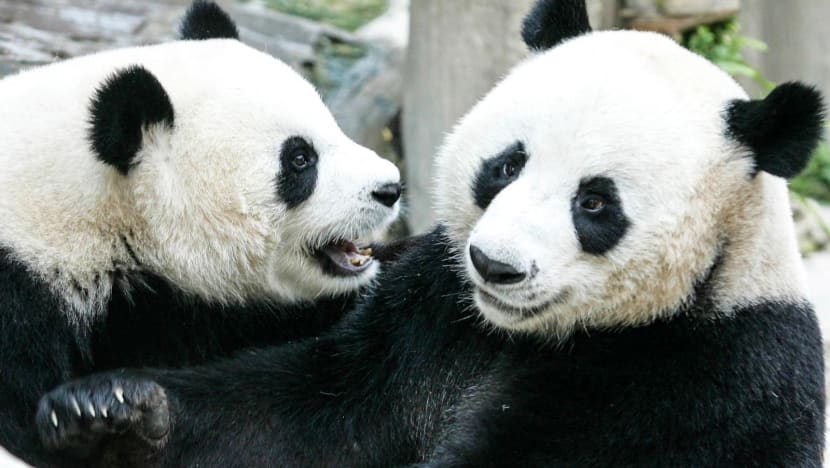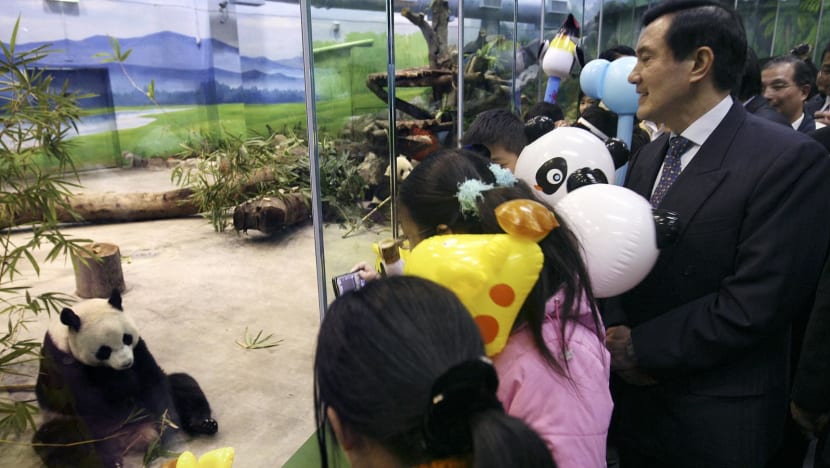SINGAPORE: When Singapore’s giant pandas Kai Kai and Jia Jia - both on loan from China - had a cub of their own in 2021, an online poll to decide its name drew tens of thousands of votes in just a few days.
And as soon as the baby panda was ready for public viewing, visitors flocked to the zoo in throngs, with some willing to wait hours on end just to catch a glimpse of four-month-old Le Le.
That will be no small number of dismayed folks when the time comes for the cub to return to China this August, as part of the agreement with Beijing.
It's not just in Singapore: When the Chiang Mai Zoo's panda Lin Hui - a resident there since 2003 - died last month, the outpouring of grief appeared to outweigh the 15 million baht (US$435,000) insurance payout Thailand owed to China under the terms of its loan.
The universal affection for the furry, rotund, black-and-white bears goes some way in explaining their longstanding deployment by China as soft power symbols - a practice dubbed panda diplomacy.

But is this changing along with perceptions of China on the global stage, as well as what could be characterised as roiling ties with several countries in the West and beyond?
“In the past, it seemed that China was wanting to seek or strengthen favourable relations with other nations,” said historian Elena Songster from the Saint Mary’s College of California, who authored the book Panda Nation.
“Now, panda loans seem to reflect which nations seek favourable relations with China.”
WHAT'S PANDA DIPLOMACY?
Soft power can be seen as a non-coercive form of influence, as explained by Assistant Professor Benjamin Ho, who coordinates the China programme at the S. Rajaratnam School of International Studies (RSIS) think-tank.
"Panda diplomacy represents just one of the many tools of diplomacy China has at its disposal," he said.
The creatures have long been utilised as such, with Tang Dynasty records showing that the practice of gifting pandas to other countries dates back to the seventh century.
In more modern times, the then-Soviet Union was gifted giant pandas Ping Ping and Qi Qi in the 1950s, after it became the first nation to establish diplomatic ties with China.
Shortly after former American president Richard Nixon’s high-profile visit to China in 1972, Ling Ling and Hsing Hsing were welcomed to the Smithsonian National Zoological Park in Washington by thousands.
Today, countries who want pandas must loan them on a ten-year lease with a fee of up to US$1 million a year. Any cubs born during the loan period also become China’s property.
There are at least 60 giant pandas spread across 18 countries.
The pandas “serve as an index as well as a vehicle for promoting good relations between China and the recipient country”, said soft power expert Alan Chong, also a senior fellow at RSIS.
When Chinese President Xi Jinping visited Russia in 2019, he announced the loan of two pandas to Moscow’s zoo, which his counterpart Vladimir Putin called a “gesture of particular respect and trust”.
Last year, Beijing sent two giant pandas to Qatar just ahead of the football World Cup, fulfilling a request by Emir Sheikh Tamim bin Hamad al-Thani during an earlier state visit to China.
The pandas represent the "profound friendship" between the nations, according to Qatar's envoy to China.
The strength of their appeal can be said to warm even the iciest of relations.
In 2005, pandas Tuan Tuan and Yuan Yuan were offered as a goodwill gesture to Taiwan, which China views as its own territory. Even though Taipei initially said no, the bears arrived three years later.
And Tuan Tuan's death in November last year - in these far less cordial times - was met with widespread mourning, with Taipei's mayor thanking the panda for "bringing happiness to Taiwanese people".
“There are many people in Taiwan who oppose China's claim to the island, yet still love having the panda in their zoo," said Ms Songster.

WHAT'S CHANGED?
The latter-day rise of China under Mr Xi has set off a range of reactions and narratives globally - with none as prominent as its superpower rivalry with the United States.
Already tense relations with Washington have now soured to perhaps their lowest point in decades, after a spate of bust-ups ranging from maritime confrontations and the American downing of a suspected Chinese spy balloon to Beijing banning a US chipmaker over security concerns.
Surveys point to increasingly negative views on China and growing concern over its burgeoning influence - and not just among Americans.
It is in such times when "China may find that it increasingly needs a friendly face to put forward", said Ms Songster.
And Beijing has been diplomatically prolific of late, whether in brokering a détente between Saudi Arabia and Iran or attempting to mediate the Ukraine-Russia conflict.
Mr Joshua Kurlantzick, senior fellow for Southeast Asia at the Council on Foreign Relations think-tank in New York, described China as having "a desire to reduce its unpopularity in some parts of the world like Europe and Northeast Asia, and play on its growing popularity in some other places like Southeast Asia and Africa".
Couple these ambitions with its domestic exit from COVID-19 and an economy on the rebound, and panda diplomacy fits right into an effort to build and ramp up soft power in the next few years, he added.
WHAT DOES THE FUTURE BEAR?
China is keenly aware of the power and benefits of panda diplomacy - and skilled at deploying it, said Ms Songster.
She added that Beijing's growing heft in the global arena further gives it the "luxury of coupling panda diplomacy with reward, expectations or negotiations".
After French President Emmanual Macron’s visit to China in April, Beauval Zoo pandas Huan Huan and Yuanzai had their lease extended to 2027.
It was the same trip where Macron remarked that Europe should not “follow” US policy on Taiwan - comments that attracted widespread furore in the West, and praise in China.
Elsewhere and in recent times, pandas loaned to the San Diego and Memphis zoos in the US have returned to China at the end of their agreements, with two more at Washingon's Smithsonian due back in Beijing later in 2023.
The April homecoming of Ya Ya from Memphis was met with an especially eager reception in China, with a related hashtag hitting 430 million views on social media platform Weibo.
This was after the death of her mate Le Le in February, in the wake of pictures circulating online in which he appeared in poor shape and health. Furious Chinese netizens levelled accusations of mistreatment and neglect by the American zoo, with several drawing a connection to what they perceived as anti-China sentiment in the US.
Yet the Chinese are not alone in flag-waving over their national animals - just this week, a Miami zoo apologised after New Zealanders complained about their treatment of a kiwi bird.
Analysts said to expect people in China demanding more involvement and more accountability when it comes to panda diplomacy.
As a practice - plus soft power tool - it remains compelling to Beijing as a symbol of goodwill and friendship, and thus is unlikely to be discarded, they said.
Comparing panda diplomacy to trade deals, Ms Songster explained that while the latter affect people in ways they are mostly completely unaware of, the creatures are very public beings that appeal to the popular masses - and critically, appeal to the emotions.
"You cannot reduce them to guns, bullets, dollars, cents, yuan, numbers, computers, calculations, things like that," said RSIS' Dr Chong.
"With pandas, it's just good feelings ... It's very hard to portray them negatively."